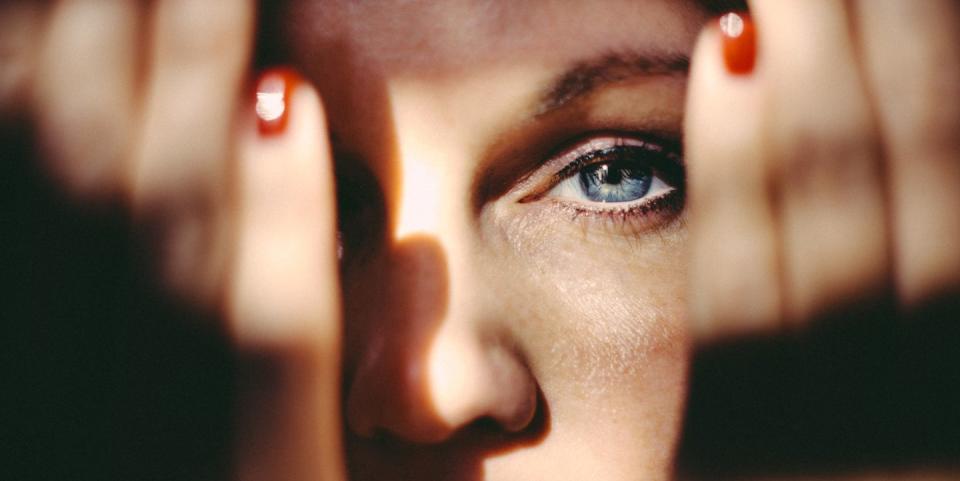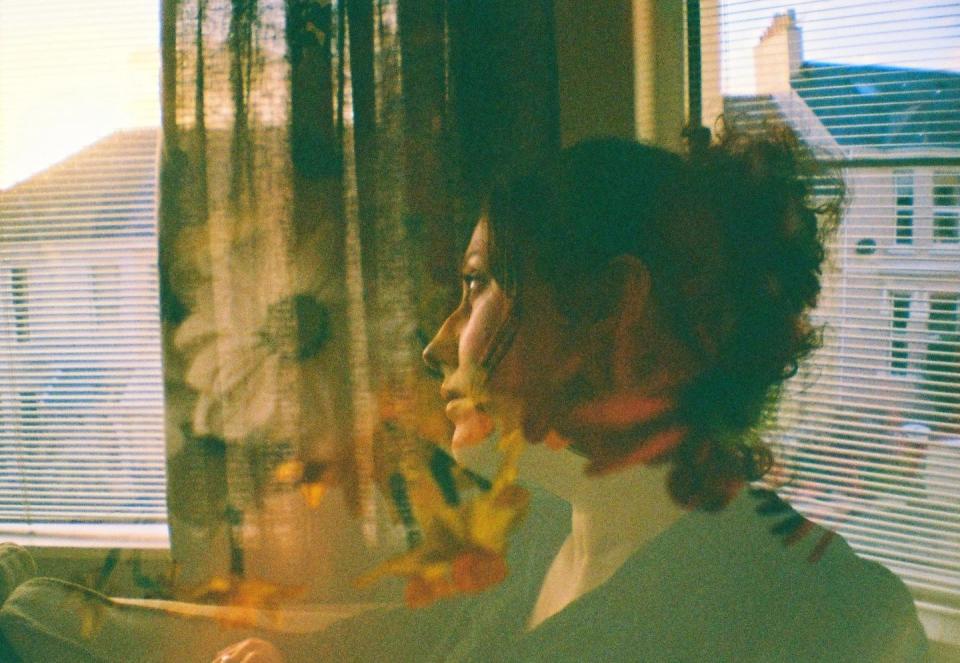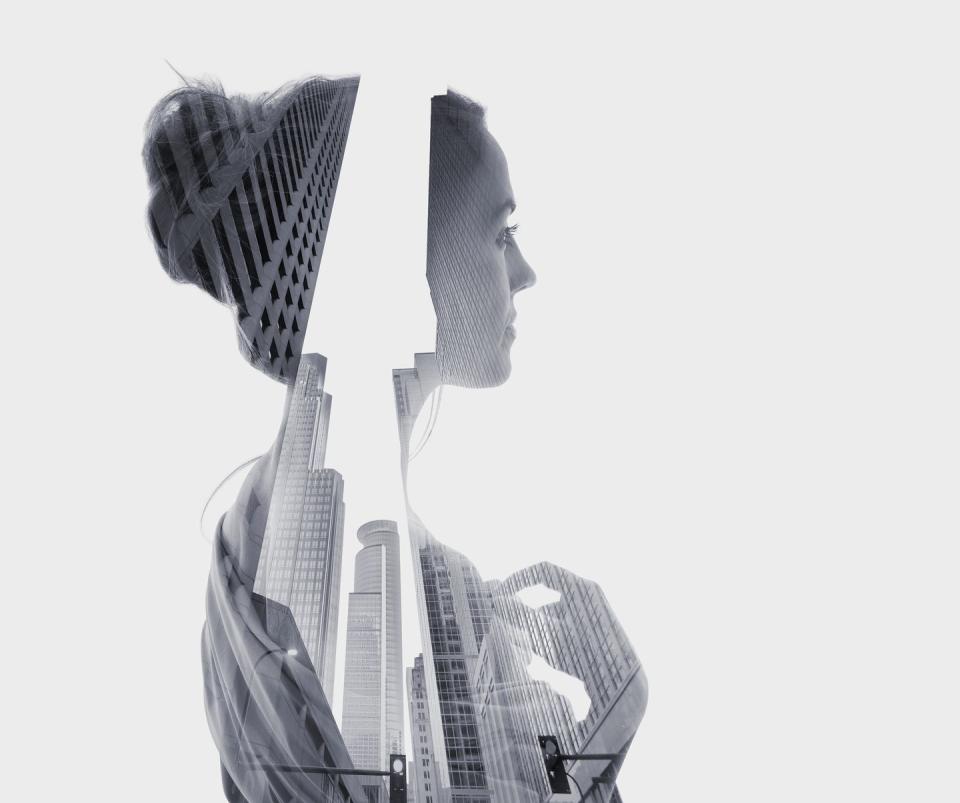'I Feel Like An Inbetweener'

I became acutely aware that my life was stuck in the ‘in between’ one Tuesday afternoon, when I received a gift from a friend in the post. Two oyster shells, still smelling of the sea and lacquered with gold foil, to be used as salt and pepper dishes. They’re beautiful. But I wrapped them back up in their pink paper. Like me, they’re in limbo, waiting to come into their own and establish themselves in a real home, one day.
Most of my things are in storage as I lodge with my boyfriend Mark at his family friend Brenda’s home while she’s living abroad. Just writing that makes me anxious, reminding me of the tenuous reality of my situation. I gave up my beloved-but-too-small flat so we could cohabit during lockdown(s), so I sit by someone else’s fireplace, surrounded by their art and bathe in their tub. I’m technically at home, but also not: I’m living in the shadow of my future home as my partner and I try to buy our first one together.
T.S. Eliot wrote in his poem, The Hollow Men: ‘Between the idea / And the reality / Between the motion / And the act / Falls the Shadow.’ I lurk in this shadow in my relationship, as well as in my living situation.
We met on Tinder – retro, I know – and started dating four months before the pandemic hit. Despite being together for a year and a half, we’ve never attended a work event together, never been clubbing, nor to a wedding or gig. Our relationship has existed in the spaces in between lockdowns, tiers and travel restrictions. Oh, and just when it seemed I couldn’t catapult my life any further into the sea of uncertainty, I pulled up the final anchor when I walked away from my life-defining job at the successful literary agency I set up.
I’m now between jobs, preparing to start my own business that, as of yet, has no URL or VAT number to speak of. I’m totally submerged in the tempestuous waves of instability, which separate the continents of my ‘real’ life. The panic of uncertainty rises in my chest each morning.
Sometimes we orchestrate these periods of ambiguity – we knowingly destabilise ourselves – but we also get made redundant, get asked to leave our homes or lose an important relationship against our will, and it can feel like bad luck, as if something in our lives has gone ‘wrong’. But what if we were to reconsider these setbacks and, rather than seeing them as obstacles, reframe them as a rite of passage towards the new version of ourselves we so ardently want to be?

The word ‘liminality’ derives from the Latin root ‘limen’, which means threshold. David Gray, author of Liminal Thinking, describes it as: ‘Periods of transition during which the normal limits to thought, self-understanding and behaviour are relaxed, opening the way to novelty and imagination, construction and destruction.’ That certainly sounds familiar. Covid-19 made liminality a universal experience, as we said goodbye to an old way of living and sat in our homes, still outside of life on the other side of the pandemic.
But the experience of being betwixt isn’t reserved for a global crisis, nor is it reserved for someone like me who has allowed all facets of her identity to simultaneously merge, tumble and remould. It’s a place we all frequent throughout life: it’s the alternative reality when we are between relationships, broken up but not completely disentangled; it resides between jobs when we make a career change; and it’s in the disorientation of being between homes, having left one we’ve nurtured and perhaps loved, but not yet having established a new nest.
I speak to Creative Studio manager Emma Pawski, who also catches herself in a stasis between major life events, and not for the first time. In 2018 she emigrated to Portland, Oregon, when her boyfriend got a job at Nike HQ: ‘It was exciting. Sam and I got married so I could go with him, and it felt like an adventure. I wasn’t worried about finding a job, I had a lot of contacts and made introductions to people out there before we made the move.’
But when Emma arrived in the US, she struggled to find work. It was the first time in her career she’d been unemployed. She was living in a new country, trying to find a new home and, despite being hugely employable, the cost and complications around visa sponsorship made her difficult to employ. ‘People would say, “We’d hire you in a heartbeat, but we can’t sponsor you”.’
It was four months until she got offered her next job as a studio producer, then another four waiting for her visa to come through. ‘Everyone tells you to just relax and enjoy the time, but I couldn’t. I didn’t realise how much my self-identity and worth came from a job. It’s a rollercoaster full of emotions because there’s no routine or familiarity. You’re in this pause and there’s all this time to reflect on yourself; it’s really scary.’

I talk to Emma on Zoom from her in-laws’ family home in Surrey. Having recently returned from the US with her husband, she’s now waiting to move to London and is back on the job market. ‘It feels like you’re being suspended between two worlds, between your existence and the past, waiting for this emerging new life that’s coming.’ I ask her what advice she’d give to someone struggling with this kind of life hiatus: ‘You have to just keep pushing towards it. Keep moving through it and you’ll get there. It won’t last forever.’
I admire Emma’s determination and ambition, and she’s right, any kind of small movement forward feels momentous when you’re trapped in a state so seemingly stagnant. But I also feel inclined to surrender myself to this strange hinterland and wonder if pushing through is conducive to stability and certainty. What if we can appreciate these moments so they’re not bad patches to ‘get through’ but necessary pauses leading to essential reflection?
Dr Julia Samuel is a psychotherapist and author of This Too Shall Pass, a book about change, crisis and hopeful beginnings. She tells me: ‘People often try to short circuit this fertile void… when you have shifted to the new and stepped out of where you were. You’re going back and forth between your old self and your new self, experiencing and expressing different versions. It’s an incredibly important time.’
Her clients often want a fast-track approach to get through such uncertain periods. ‘People want it to happen very quickly, so they block the transitional process,’ she says. ‘Then they go into the next phase but with much more limited emotional capacity because they’ve crunched it, gritted their teeth, and they don’t fully integrate all that they’ve been.’ In her book, she writes: ‘Our innate drive to get on is profoundly powerful, yet we need to slow down, to give ourselves space between our old and new selves.’
What’s the rush? I speak to many inbetweeners like myself and it’s clear all of us feel that deep urge to get on. And, despite my situation not being a terrible one – I’m safe, I have a place to live, I have job prospects and a loving partner – the women I speak to all seem to be grieving and grappling with their identities. Dr Samuel defines this transitional phase as a living loss: ‘It is grief. The ending of all these different aspects of yourself; identity is at the heart of change. So as our relationship or job status changes, where we live and our sense of safety changes, that alters our sense of self. It is profoundly disturbing when we feel our identity is out of sync with who we feel we are.
She also explains how our identities are dependent on being accepted by other people. ‘We need to feel that we’re loved and we belong, that we’re part of a tribe. In the process of change, that can throw you out of that sense of feeling loved.’

When we’re in liminal spaces in our life, our instinctive urge is to recommit ourselves to core identity pillars – I am a journalist, I am a homeowner, I am engaged – as quickly as possible. These provide the outline for who we are, enabling others to colour us in based on their own understanding of those identities. ‘People can view this limbo state as negative because we’re in a culture that wants us to constantly progress.
If there’s any sort of pause, people start to wonder why, and if there’s something wrong. There’s an expectation to keep getting to "the new thing",’ says Emma. And it’s true. I’d barely handed in my notice before being inundated with a slew of ‘What’s next?’ and ‘I can’t wait to see what you do with your new business’ messages. It’s clear that I’m allowed a short break between leaving my job and starting a new one, but only if I’m prepped to jump straight into the next chapter of my life, where I can be easily contained and identifiable.
Aislinn is a 25-year-old who, having completed her yoga training course, was planning on doing her diving instructor training before settling in Australia and finding a job in oceanography. The pandemic scuppered her plans, and she found herself renting a room from a friend in London, trying to find a job. ‘It can feel quite shameful,’ she tells me. ‘People feel a bit sorry for you, they find it difficult because you’ve lost your identity. How do you fit into someone’s life if you don’t have these core things and you haven’t met the check points people use to define you?
‘All of my friends have progressed in their careers. I remember being at brunch and they were talking about their salaries and what was happening at work. I felt really stunted. I’ve spent all my money and not got anywhere. I was thinking, How am I going to get out of this? It’s terrifying.’ But Aislinn also explains how her liminality feels more acceptable because of her age, ‘I’m at the start of my life, so I’m still allowed to be figuring it out. I’m still in search of my attachment to that key identifying thing, and that’s OK.’
I’m not desperately grappling for self-definition just to have something to pop in my Instagram bio, but being in the ‘fertile void’ is having a tangible effect on my mental health. Not only does it place me in an in-between state, but it’s disruptive of my sense of self. I am separated from the big things that make up my self-perception and my awareness of how other people see me.
I speak to neuroscientist Dr Yewande Pearse about how our identity is formed and why we find it so hard to exist in the in between. ‘When we find ourselves in a liminal state, it’s usually because uncertainty or rapid change has arisen in our world, challenging the continuity and inner unity that we strive towards in forming our identity,’ she explains. ‘This leads to an identity crisis, which can cause a lot of distress and even lead to clinical conditions such as anxiety and depression.’
I place my hand on my heart and feel the slow, throbbing, thudding in my chest and the rush of nerves in my stomach. My anxiety levels are off the scale, and every day there’s this slow burning undercurrent of Who am I? What am I worth without these identifying pillars? And where the hell are we going to live? When I try to describe this hiatus to friends, I find myself pincering my fingers and rubbing the tips together, in search of something palpable, to help me explain the feeling of this state to those outside of it. But that’s the point: it’s invisible and there is nothing to grip onto.
Without my core identity pillars of work and home in place, I find it harder to connect with my communities. My contemporaries post about an industry awards ceremony that I won’t be attending this summer, and there’s a strange taste in my mouth that I can’t assign to either FOMO or relief.

I find myself backing away from social media, unsure as to how I can construct myself there now that I’m floating between who I was and who I want to be. It doesn’t feel acceptable to say, ‘Hey, I’m changing my life, and it looks awkward and weird and mangled and confusing,’ because people don’t want more confusion. They want certainty. And the process of change is hard to capture, let alone caption.
I speak to Jess, a business owner from Leeds, who tells me about the liminal state of her relationship. Jess and Grant are married and have been together for 13 years. After a sustained period of feeling unhappy, the couple decided to call an end to their marriage, sell their house and part ways. ‘We’ve had the most relaxed and lovely relationship,’ Jess says.
‘No ups and downs or rollercoaster moments. But we got to a really stagnant place. All the good stuff that makes a relationship has faded or became chipped. It was devastating.’ But having sold their home, Jess and Grant discussed how wrong it felt to be abruptly ending such a significant relationship after so many happy years. So they decided to live separately for at least six months.

‘This is not a "Ross and Rachel" break. We’re still married but we’re taking a holiday to grow. Neither of us has ever lived on our own; I’ve always wanted to.’ I speak to Jess on the night she moves into her new flat. ‘We’re privileged to have the option to live apart, that’s not everyone’s reality. The plan is that we’ll date – I already can’t wait to walk into his place and have him cook me dinner. This is making me happy. I’m nervous because the future is unknown. But I need to recharge before I go into the next stage of life, whatever that may be.’
Dr Samuel and I discuss this concept of living apart: ‘It’s a good testing ground for the fertile void,’ she says. ‘You can experiment, then make a more informed decision.’ I asked Jess what it feels like being in this love limbo: ‘All of my emotions are heightened and my decisions feel like they have more meaning. I feel lucky and energised, but I’m also anxious.’
I definitely relate to these juxtaposing emotions and can’t deny the new lease of energy from playing with the different possibilities of my future. What amazing things could my new business offer? Perhaps Mark and I will spend more time abroad, and not owning a home is a good thing.
I feel more readily able to access my creativity in this state, excited to write my next novel but also happy to paint a terrible picture of daffodils, just for the hell of it. It reminds me of Ali Smith’s description of liminality in her book, Artful: ‘It’s a kind of in between. A place we get transported to. Like when you look at a piece of art or listen to a piece of music and realise that, for a while, you’ve actually been somewhere else.’
There is real joy in being suspended in the possibility of a different version of you, or a new way of living – even if just for a moment. And perhaps that’s the more poetic purpose of liminality, to let us explore who we could be, outside of an identity that’s ossified. It’s a chance to remould, for things to get messy as we play with clay.
When we’re not in transition – when we’ve got the job, the relationship or the stable home – it nails us to a perfunctory, perhaps even performative idea of our identity. Actually, we’re so complex and contradictory. We all have multiple selves. I’m not just a writer, a girlfriend or a lodger; who I am goes beyond those simplified ideas.
The liminal is undoubtedly tough and sharp-edged but it might also be the space of pure truth. It’s a fleeting state, inviting exploration. Our identities will solidify again, but how can we expand if we don’t allow ourselves to learn something in the discomfort of change? It’s a place of power and lush possibility, it just demands we surrender to chaos, upheaval and the worst human affliction of all: not knowing what’s next.
Abigail Bergstrom’s debut novel What A Shame is out February 2022
This article appears in the July issue of ELLE UK, out now on newstands.
You Might Also Like

 Yahoo Finance
Yahoo Finance 